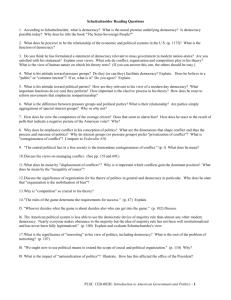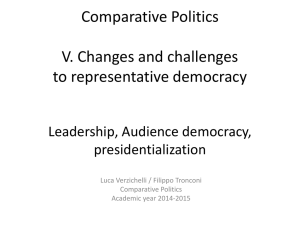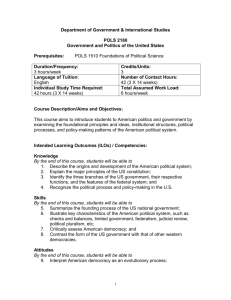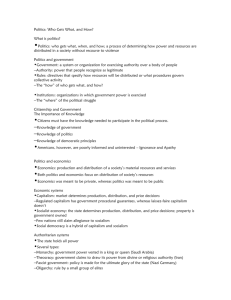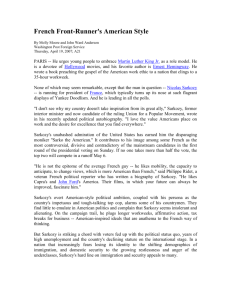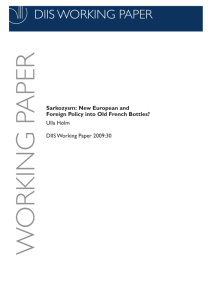PSA Conference, 2009
advertisement
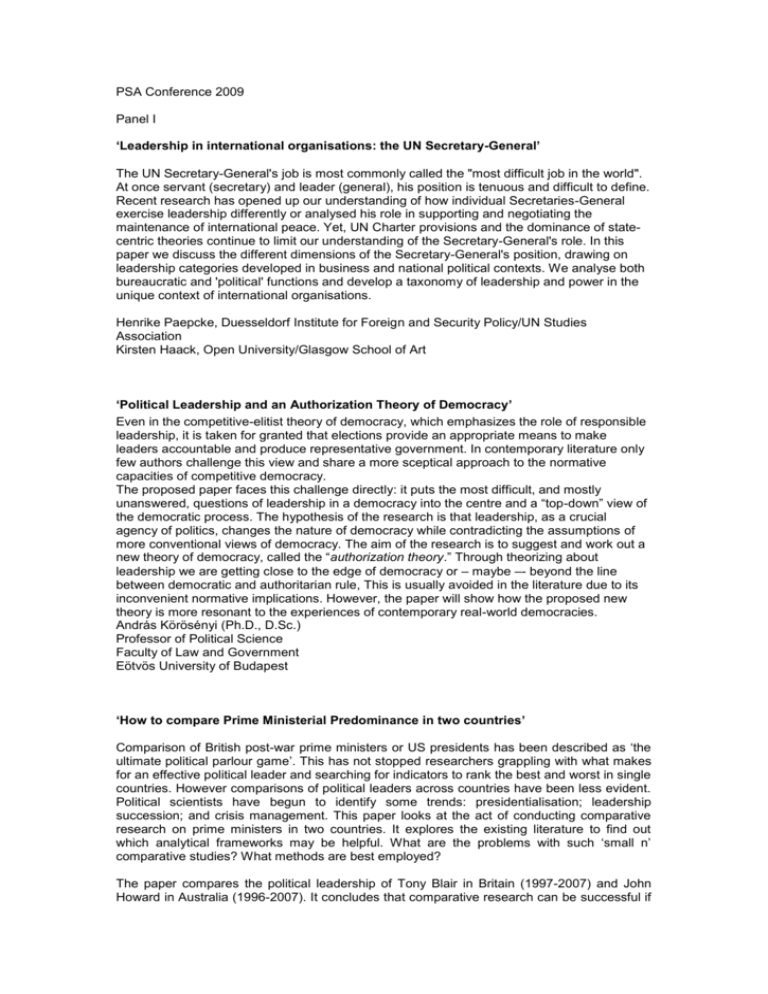
PSA Conference 2009 Panel I ‘Leadership in international organisations: the UN Secretary-General’ The UN Secretary-General's job is most commonly called the "most difficult job in the world". At once servant (secretary) and leader (general), his position is tenuous and difficult to define. Recent research has opened up our understanding of how individual Secretaries-General exercise leadership differently or analysed his role in supporting and negotiating the maintenance of international peace. Yet, UN Charter provisions and the dominance of statecentric theories continue to limit our understanding of the Secretary-General's role. In this paper we discuss the different dimensions of the Secretary-General's position, drawing on leadership categories developed in business and national political contexts. We analyse both bureaucratic and 'political' functions and develop a taxonomy of leadership and power in the unique context of international organisations. Henrike Paepcke, Duesseldorf Institute for Foreign and Security Policy/UN Studies Association Kirsten Haack, Open University/Glasgow School of Art ‘Political Leadership and an Authorization Theory of Democracy’ Even in the competitive-elitist theory of democracy, which emphasizes the role of responsible leadership, it is taken for granted that elections provide an appropriate means to make leaders accountable and produce representative government. In contemporary literature only few authors challenge this view and share a more sceptical approach to the normative capacities of competitive democracy. The proposed paper faces this challenge directly: it puts the most difficult, and mostly unanswered, questions of leadership in a democracy into the centre and a “top-down” view of the democratic process. The hypothesis of the research is that leadership, as a crucial agency of politics, changes the nature of democracy while contradicting the assumptions of more conventional views of democracy. The aim of the research is to suggest and work out a new theory of democracy, called the “authorization theory.” Through theorizing about leadership we are getting close to the edge of democracy or – maybe –- beyond the line between democratic and authoritarian rule, This is usually avoided in the literature due to its inconvenient normative implications. However, the paper will show how the proposed new theory is more resonant to the experiences of contemporary real-world democracies. András Körösényi (Ph.D., D.Sc.) Professor of Political Science Faculty of Law and Government Eötvös University of Budapest ‘How to compare Prime Ministerial Predominance in two countries’ Comparison of British post-war prime ministers or US presidents has been described as ‘the ultimate political parlour game’. This has not stopped researchers grappling with what makes for an effective political leader and searching for indicators to rank the best and worst in single countries. However comparisons of political leaders across countries have been less evident. Political scientists have begun to identify some trends: presidentialisation; leadership succession; and crisis management. This paper looks at the act of conducting comparative research on prime ministers in two countries. It explores the existing literature to find out which analytical frameworks may be helpful. What are the problems with such ‘small n’ comparative studies? What methods are best employed? The paper compares the political leadership of Tony Blair in Britain (1997-2007) and John Howard in Australia (1996-2007). It concludes that comparative research can be successful if an ‘interactionist’ approach is adopted considering prime ministerial capacity within the contextual operating environment. It is the marriage of institutional and personal factors that creates a predominant prime minister. Study of the individual actor (character, personality, political skill, use of rhetoric) is blended with analysis of the institutional framework within which the actor is based (advisory sources, party, legislature, executive). Mark Bennister Department of Politics and Contemporary European Studies University of Sussex Panel II This panel looks at political leadership in plural institutions but in one country: France. It is an attempt to look at the nature of contemporary French political leadership and at the specificities of the French leadership process and style. There are several existing studies of French political leadership and this is an attempt to promote that branch of study within the discipline of political investigation. In this panel there are case studies of de Gaulle and of the particular focus group methods associated with President Sarkozy as well as an overview of political leadership types in the Fifth Republic. ‘Approaches to Leadership: Culture and Performance’ A politician like de Gaulle demonstrates that the ‘modern’ in politics – television, radio etc can be used as a vehicle to transmit and apply very old, even chivalric, ideas about political relationships. A study of the political persona of de Gaulle also shows that politicians have an ‘imagined persona’. A political culture that has a rich and dramatic history offers great potential for ‘performance’ by this persona. The Fifth Republic heightens the role of symbolic politics by bringing to the heart of the system the ‘performance’ of individuals and the reactivation of appeals to French history and a dramatic view of political action. The world of symbolic politics is much wider than the formal political one. It is informed by myths and traditions, national and subnational identities, memories, histories and allegiances, which are ‘envisioned’ by the individual who in this way articulates and transcends discrete political, social and ideological constituencies and thus can be legitimated (through election but not only in this manner) by the national community. Professor J. Gaffney ACE Aston University ‘Political Leadership in Contemporary France’ This is an examination of one aspect of French ‘exceptionalism’ as depicted in the literature on French politics and political culture. This paper looks at the various attempts to understand the specificities of French political leadership – particularly Republican leadership. This will involve an examination of the ideas of French ‘Caesarism’, heroic leadership and the emergence of the Presidency as the focal figure and organising in French Fifth Republic politics. This will mean the testing of the various models against the current theories of leadership in western societies as well as the new styles associated with the Fifth Republic. A tentative classification of French political leadership will be proposed based on both French and western leadership characteristics in an attempt to close the gap between French specificity and the generalisations about political leadership in the contemporary west. ‘Administrative governance and identity: analysing reactions to the Attali Commission’s proposed abolition of the département’. Soon into his term as President, Nicolas Sarkozy commissioned Jacques Attali, former adviser to Mitterrand, to investigate ways to stimulate economic growth (‘la liberation de la croissance’). Proposal 260 of the report, published in February 2008, recommends abolishing the département. Closely tied to Raffarin’s 2002 decentralisation plans, the proposal has reignited a long-running debate about streamlining political levels of territorial administration. The paradox is that, although the département was itself an artificial administrative construct for central state control, in the recent trend towards regionalization, the removal of a 'decentralised' layer of governance is perceived by many as a centralising move, given the greater facility for Paris to control fewer layers of administration (rather than a move meant to actually strengthen the regions). Drawing on French press, websites and internet blogs (including that of Monsieur Attali) this paper reveals the emotional attachment of French citizens towards the département. In fact, the département may be the most ‘accessible’ expression of the Republic, bound up with the identity of the individual, the political class and the nation. In many senses, this artificial political construct, purposely created to bear no reference to history or belonging, has become the most significant carrier of French territorial identity, hence Sarkozy’s recent assurance that the département is here to stay. Despite all arguments of efficiency and cost-saving in favour of abolition, nostalgia and political culture may ultimately be its saving grace. Paul Stephenson (Maastricht University)
